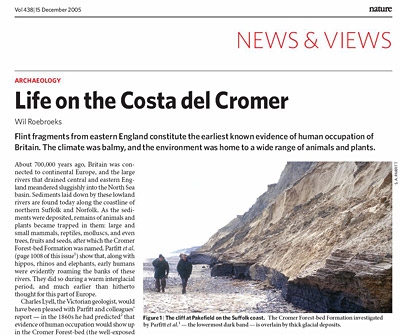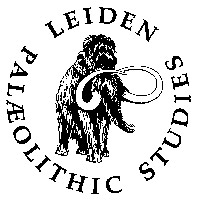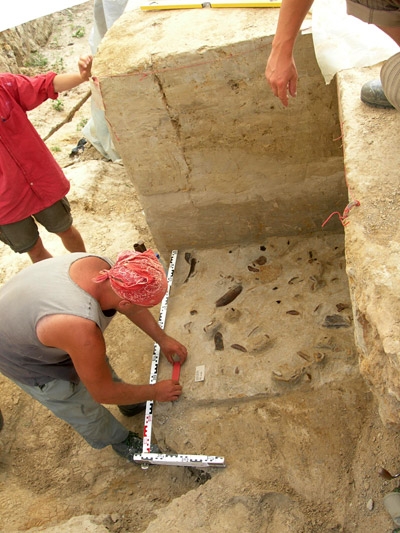2008 Culture and cognition of Palaeolithic hominins
The Palaeolithic period extends from the earliest stone tools (and in Europe, earliest occupation) to the beginning of the current warm period.
This record provides evidence for the behaviour and culture of a number of species of hominins, the taxonomic group that includes our own species, Homo sapiens. Information about these characteristics and how they changed over time is central to understanding human evolution and explaining why humans act the way they do.

The timing and nature of the earliest hominin occupation of Europe has been a subject of long-standing investigation at Leiden. The evidence for this period has been improved by recent archaeological discoveries at Pakefield in the UK, demonstrating surprisingly early occupation of Europe north of the major mountain chains.
The successfully completed Leiden NWO project Changing views of Ice Age Foragers developed an ecological and chronological framework for the Middle Pleistocene, based on collaboration with palaeoecologists and geologists. This provided a higher resolution for the chronology of early occupation and archaeological evidence for hominin activities.
Research by the Human Origins group on this subject specializes in criticism of the archaeological evidence for early hominin presence, and this approach is employed in current doctoral research.

Currently Wil Roebroeks is a member of the UK-based Ancient Britain in its European Context project (AHOBII), providing expertise on the early occupation of Europe and the behaviour of European hominins.
The Human Origins group carries out detailed analyses of faunal remains and lithics, including spatial, refitting, technological and typological analysis, of museum collections and excavated assemblages from the Lower and Middle Palaeolithic. This research is important for the reconstruction of the technological, spatial and subsistence behaviour of early European hominins. Subsistence behaviour is a major focus of research at Leiden, with implications for ongoing debate on the role of hunting versus scavenging.
An upcoming thesis will present the first detailed study of bone material found together with spectacularly preserved wooden spears at the Lower Palaeolithic site of Schöningen in Germany, indicating that this site represents a kill-butchery site. Another upcoming PhD thesis assesses whether Neandertals chose to focus on high-yield resources in a range of environmental conditions.

Another important topic of research is the environmental tolerance of hominins in northern Europe, in particular in the extremes of the glacial-interglacial cycle. Their ability to cope with fully-forested interglacial conditions is addressed through study of the taphonomy of site distribution, and analysis of the archaeological evidence for Neandertal subsistence strategies in the last interglacial period (the Eemian).

On a larger geographical scale, current doctoral research addresses the constraints on Neandertal range limits. Cognition and behaviour of Neandertals is overall subject of current research at Leiden. A recent project specifically addressed the implications of archaeological evidence that Neandertals were successful hunters, employing data and models from ethnography, palaeoanthropology and behavioural ecology. Future research will develop a behavioural ecology of Neandertals to identify implications for the use of space, technology and subsistence.
The University of Leiden is currently carrying out excavations at the Middle Palaeolithic site of Neumark-Nord in Germany in collaboration with the State Office of Archaeology of Sachsen-Anhalt and the University of Mainz. This important location has deposits from a long time period and very different environmental contexts, and is yielding a wealth of lithic and faunal material as well as detailed spatial information. This evidence is relevant to a range of Human Origins research questions, including the spatial behaviour, subsistence strategies and environmental tolerance of Neandertals. A field school at the site trains students in Palaeolithic excavation and post-excavation techniques.
